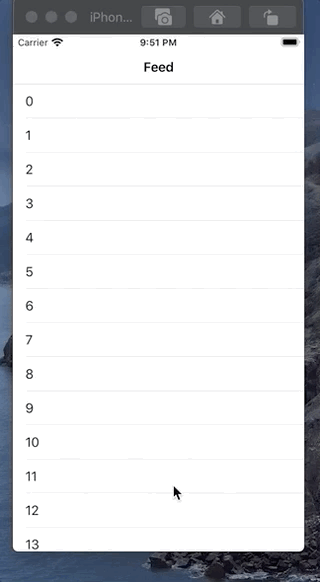I'm trying to paginate data (infinitely scroll my tableview) using firestore. I've integrated the code google gives for pagination as best I can, but I'm still having problems getting the data to load in correctly.
The initial set of data loads into the tableview as wanted. Then, when the user hits the bottom of the screen, the next "x" amount of items are load in. But when the user hits the bottom of the screen the second time, the same "x" items are simply appended to the table view. The same items keep getting added indefinitely.
So its the initial 3 "ride" objects, followed by the next 4 "ride" objects repeating forever.
123 4567 4567 4567 4567...
How do I get the data to load in correctly?
func scrollViewDidScroll(_ scrollView: UIScrollView) {
let offsetY = scrollView.contentOffset.y
let contentHeight = scrollView.contentSize.height
if offsetY > contentHeight - scrollView.frame.height {
// Bottom of the screen is reached
if !fetchingMore {
beginBatchFetch()
}
}
}
func beginBatchFetch() {
// Array containing "Ride" objcets is "rides"
fetchingMore = true
// Database reference to "rides" collection
let ridesRef = db.collection("rides")
let first = ridesRef.limit(to: 3)
first.addSnapshotListener { (snapshot, err) in
if let snapshot = snapshot {
// Snapshot isn't nil
if self.rides.isEmpty {
// rides array is empty (initial data needs to be loaded in).
let initialRides = snapshot.documents.compactMap({Ride(dictionary: $0.data())})
self.rides.append(contentsOf: initialRides)
self.fetchingMore = false
DispatchQueue.main.asyncAfter(deadline: .now() + 5, execute: {
self.tableView.reloadData()
})
print("first rides loaded in")
}
} else {
// Error
print("Error retreiving rides: \(err.debugDescription)")
return
}
// reference to lastSnapshot
guard let lastSnapshot = snapshot!.documents.last else{
// The collection is empty
return
}
let next = ridesRef.limit(to: 4).start(afterDocument: lastSnapshot)
next.addSnapshotListener({ (snapshot, err) in
if let snapshot = snapshot {
if !self.rides.isEmpty {
let newRides = snapshot.documents.compactMap({Ride(dictionary: $0.data())})
self.rides.append(contentsOf: newRides)
self.fetchingMore = false
DispatchQueue.main.asyncAfter(deadline: .now() + 7, execute: {
self.tableView.reloadData()
})
print("new items")
return
}
} else {
print("Error retreiving rides: \(err.debugDescription)")
return
}
})
}
}

